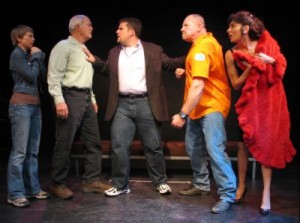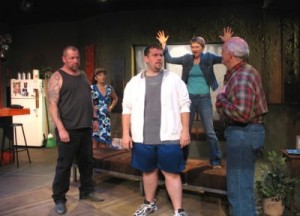
In Larry Dean Harris’s world premiere dramedy The Prodigal Father, the Celebration Theatre offers its LGBT audience its best production since last Fall’s Porcelain, not coincidentally directed by Porcelain’s Michael Matthews, fresh off the much lauded The Jazz Age.
The Prodigal Father adroitly blends family drama with clever one-liners as it explores the difficulties inherent in dealing with an aging parent across the Red State-Blue State divide, and features the kind of long-term gay couple found coast to coast, but rarely seen in film and TV or on stage.
30something Jamey (Allain Rochel) and his older partner Nick (Joe Rose) are bears, heavyset gay men making no attempt to conform to gay society’s insistence on gym bunny looks and fitness. Nick is a construction worker and Jamey a successful playwright, and the life they have made for themselves in their New York City loft is a far cry from the Tennessee upbringing Jamey (then known as Jimmy Ray) has been doing his best to escape from. The two men have their differences (age, work, education), but they’ve come to fit together like two pieces in a jigsaw puzzle.
The couple’s life together undergoes a radical change when Jamey’s slightly older sister Linda (Truly Magyar) leaves a message on their answering machine with the news that Earl, their elderly good-ol’-boy dad, has hit a female nurse in the long-term care facility where he has been staying. This is a bit much even for Earl, for whom hitting is nothing out of the ordinary. As Jamey quips, “Let’s see…six brothers…high school football…the marines…two children…nursing home caregivers. You might say it’s his life’s work.” Or was his life’s work before finding God.
Sooner than you can say “Guess Who’s Coming To Dinner?”, who should arrive on Jamey and Nick’s doorstep than Earl himself (Max Gail), though the old man’s plans involve staying considerably longer than a single meal. Earl is here to move in, and though he recoils at the idea of “one room for gettin’ dressed, one room for writin’, and one room for all your living, sleeping, eating, and television,” Earl will be perfectly fine sleeping on the couch in Jamey’s upstairs office. As for Jamey’s relationship with Nick, it would seem that Earl’s way of dealing with his son’s homosexuality is a combination of denial and ignoring the obvious.
Having a live-in homophobe of a “father-in-law” is not what Nick “signed up for,” or so he tells his best friend, the glamorous Neiman-Marcus buyer Tamara Liber (Josette DiCarlo), a frequent visitor at Jamey and Nick’s loft. Earl, meanwhile, seems quite taken with the sultry Tamara (rhymes with “tomorrow”), who brings back memories of his late wife Rita May.
It soon becomes clear that Earl, though at times still sharp as a tack, is suffering from Alzheimer’s; Jamey even tells him so, though Earl’s response to that is a skeptical “So you say.” Still, there can be little doubt of the illness. A hat does not even need to drop for Earl to find himself back in the past, hunting “coons” with young Jimmy Ray, meeting his future wife at a high school dance, or under fire in the trenches of the Korean War.
At various times during The Prodigal Father’s two acts, either Jamey, Nick, or Tamara find themselves participating in Earl’s hallucinations, and learning much about him in the process … and it is here that The Prodigal Father achieves its greatest power. What really happened when Earl and young Jimmy Ray went hunting that day so long ago, and is Jamey the first gay person to figure in Earl’s life? Emotional flashbacks to years past not only bring characters in The Prodigal Father to tears, but provoke similar audience reactions as well.
Harris’s sharp, clever writing keeps The Prodigal Father from ever descending into movie-of-the-week clichés, and is frequently quite funny as well. Take for example, this phone conversation between Jamey and Linda: Linda: It’s about Dad. Jamey: Is he dead? Linda: No. Jamey: Is he dying? Linda: No. Jamey: Then it can wait. When Jamey asks Linda why she finds Nick masculine and her brother not so macho, Linda replies, “Nick works construction. I don’t remember there being a playwright in the Village People.” And later, when Jamey asks Earl if he’s been taking his meds, his father replies with a grin, “I wouldn’t know. I have Alzheimer’s. Remember?”
Director extraordinaire Matthews leaves behind the dazzling directorial pyrotechnics of Porcelain and Stupid Kids, returning here to the slice-of-real-life simplicity of his unforgettable Beautiful Thing. The performances Matthews elicits from his cast of five include some of the finest you’ll see this year, particularly the tour-de-force work of Gail (best known for his seven seasons on TV’s Barney Miller). Eschewing stereotype at every turn, Gail gives Earl depth, complexity, and heart, and when Jamey’s father collapses in sobs, only a stone could fail to be moved. Rochel and Rose do fine work, both of them, and the chemistry they share makes Jamey and Nick’s relationship seem absolutely real. DiCarlo steals every scene she’s in with her magnetic stage presence and huskily sexy voice. (She’s essentially playing two characters here, sophisticated Tamara and country gal Rita May in flashbacks, and she’s a stunner in both.) Finally, as Linda, Magyar makes the smallest role one of the most memorable, a scene in which sobs suddenly overtake her a textbook example of what great acting is all about.
Matthews has reunited the same “dream team” of designers he’s worked with in every production he’s directed since his auspicious arrival at the Celebration in 2005. Scenic designer Kurt Boetcher has surrounded the audience with Jamey and Nick’s finely detailed loft, making us flies on three of the four walls. Tim Swiss’s lighting and Cricket S. Myers’ sound design are their usual superb, imaginative work, combining forces to transport us from present to past in an instant and never allowing us to doubt which time frame we are in. Costume consultant Marjorie Lockwood and propmaster Michael O’Hara also deserve kudos for their work here.
The Prodigal Father is a co-production of the Celebration Theatre and Playwrights 6, who together brought Celebration audiences three seasonal installations of Christmastime Is Queer several years back. P6 principle Harris wrote the book for Play It Cool, probably the best musical the Celebration has staged since its multi-award-winning Pinafore. One hopes to see more collaborative efforts between these two talent-filled organizations.
In The Prodigal Father, Harris has written a play that deserves to be seen by LGBT (and mainstream) audiences not only here in Los Angeles. San Francisco’s New Conservatory Theatre Center, San Diego’s Diversionary Theater, and others across the nation would do well to take note of this powerful piece of writing. It’s hard to imagine a better staging than this one, however. With Michael Matthews and Max Gail at the helm, this is one powerful evening of theater.
Celebration Theatre, 7051B Santa Monica Blvd.,Hollywood.
www.celebrationtheatre.com
www.playwrights6.org
–Steven Stanley
March 27, 2009




 Since 2007, Steven Stanley's StageSceneLA.com has spotlighted the best in Southern California theater via reviews, interviews, and its annual StageSceneLA Scenies.
Since 2007, Steven Stanley's StageSceneLA.com has spotlighted the best in Southern California theater via reviews, interviews, and its annual StageSceneLA Scenies.







 COPYRIGHT 2024 STEVEN STANLEY :: DESIGN BY
COPYRIGHT 2024 STEVEN STANLEY :: DESIGN BY